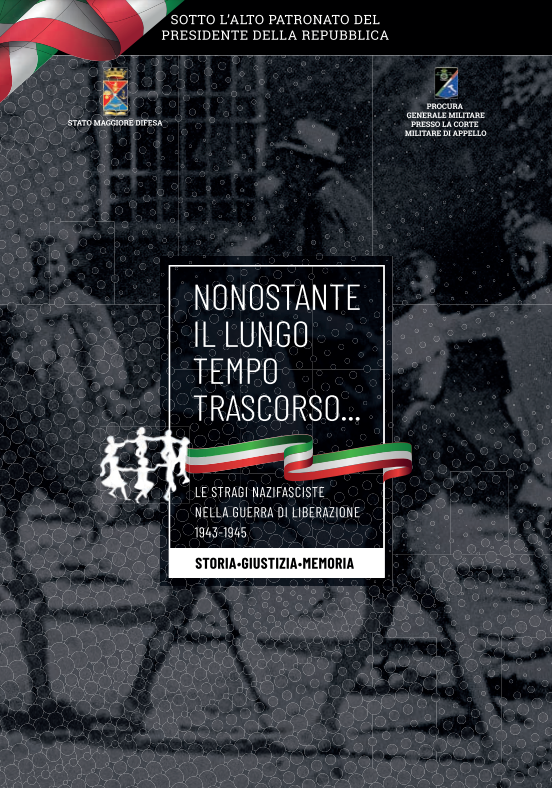EXHIBITION ON THE NAZI-FASCIST MASSACRES AT THE SFORZESCO CASTLE
-
Castello Sforzesco
-
from 20 April 2023 to 25 June 2023
-
15:30

AT THE SFORZESCO CASTLE THE EXHIBITION ON THE NAZI-FASCIST MASSACRES IN THE WAR OF LIBERATION 1943 – 1945
Tomorrow the inauguration in the Sala dei Pilastri at 15.30 pm in the presence of the institutions and the highest territorial military authorities
On Thursday 20 April, at 15.30 pm, the traveling exhibition on the Nazi-fascist massacres in the 1943 - 1945 War of Liberation entitled "Despite the long time that has passed..." was inaugurated in the "Sala dei Pilastri" of the Sforzesco Castle.
The inauguration was attended by representatives of the institutions and the highest territorial military authorities: the interregional Commander of the Carabinieri "Pastrengo", Army Corps General Gino Micale, the Commander of the 1st Air Region, Air Squadron General, Francesco Vestito, the Military Attorney General at the Military Court of Appeal, Marco De Paolis.
The exhibition, which will remain open until June 25th, is organized by the Defense General Staff and the Military Attorney General at the Military Court of Appeal under the High Patronage of the President of the Republic.
After Rome, La Spezia, Florence, Palermo and Naples, the exhibition arrives in the city of Milan where, through photographs, documents, oral narratives, historical records and video films, it aims to illustrate and raise awareness of an important page in national history, namely that of crimes Nazi-fascists committed in Italy and abroad on the civilian population and on Italian soldiers, in the run-up to and after the armistice of 8 September 1943.
The exhibition is divided into four sections: the first is dedicated to war crimes against soldiers. Through graphic panels, photographs, video films and interactive stations, the war crimes committed in Italy and abroad on Italian soldiers after 8 September, on Italian civilians abroad and on foreign civilian victims of war crimes committed by Italian soldiers.
The second section is dedicated to war crimes committed in Italy on the civilian population, while the third to deportees; also in these sections it is possible to view stations with interactive maps of the main places of massacres, internment and deportation, images, dates and events.
The exhibition narrative ends with a section dedicated to the trials held in Italian military tribunals against German war crimes from the post-war period to today (1949-2013).
In addition to the active collaboration of the Municipality of Milan, the event was also made possible thanks to the contribution of sponsors such as Poste Italiane, Stellantis, Intesa Sanpaolo, Iveco Defense Vehicles, MBDA Italia, ALIS Service (Sustainable Intermodal Logistics Association), Grimaldi Lines , IMA Group (Automatic Machinery Industry) and “Pietro Beretta” arms factory.
The exhibition will remain open to the public from Tuesday to Sunday from 10am to 17.30pm, with entrance from Piazza Castello 1.
Marco De Paolis currently heads the Military General Prosecutor's Office at the Military Court of Appeal in Rome. In 2002 he began the great season, which ended in 2013, of trials linked to the discovery in 1994 of the so-called "cabinet of shame", containing 695 hidden files on the Nazi-fascist massacres, which allowed justice to be done - albeit over 50 years later - on the main massacres perpetrated by the Nazi-fascists in Italy after the armistice.
He directed the Military Prosecutor's Office of the Republic of La Spezia from 2002 to 2008, where he investigated over 450 cases for war crimes during the Second World War, and then that of Rome from 2010 to 2018. He was public prosecutor in 17 trials, including including those for the Nazi-fascist massacres of Sant'Anna di Stazzema, Civitella Val di Chiana, Monte Sole-Marzabotto, and for the massacre of Kefalonia. He is the author of numerous essays and scientific publications on the topic of war crimes and in the field of military criminal law, including: The Difficult Justice. The German war crimes trials in Italy (1943-2013), Viella 2016 (with P. Pezzino); Sant'Anna di Stazzema. The trial, the history, the documents, Viella 2016 (with P. Pezzino); Kefalonia. The process, the history, the documents, Viella, 2017 (with I. Insolvibile).
In one of his volumes De Paolis underlines how the rediscovery of the files after a long period of judicial inactivity marked the beginning of a new trial season which lasted around eight years and proved to be not very productive: only five trials were held, while very numerous were the dismissal decrees issued due to the death of the criminal or because the perpetrators of the facts were deemed unknown. Then in 2002 the turning point occurred, favored by some episodes which occurred within a few days: on 11 April the German broadcaster ARD broadcast a news report which showed how many Nazi war criminals were living undisturbed in Germany, the program aroused sensation in German public opinion and, naturally, in Italian public opinion who learned about it a few days later; on 17 April the President of the Italian Republic Carlo Azeglio Ciampi accompanied the President of the Federal Republic of Germany, Johannes Rau, to visit the Marzabotto Shrine in which the highest German authority asked for forgiveness for the crimes committed during the world conflict; finally, on 20 April, the chief prosecutor of the Munich State Prosecutor's Office, Manfred Vick, expressed the government's interest in collaborating with the Italian judicial authorities. But if justice was set in motion it was above all thanks to the military prosecutor's office of La Spezia and the resourcefulness of De Paolis himself who in April 2002 had assumed the position of military prosecutor there. From that moment, more than eighty were sent to trial and more than fifty life sentences were imposed, most of these confirmed in subsequent levels of judgement.
